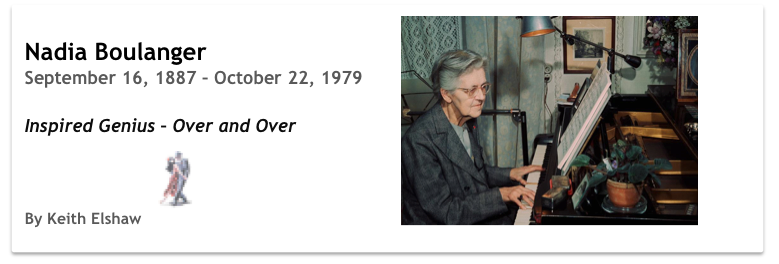Astor Piazzolla, Daniel Barenboim, Quincy Jones, Aaron Copland, Leonard Bernstein, Philip Glass, Egberto Gismonti, Michel Legrand, the list does indeed go on, and on.
Because it was in Paris perhaps their study time with her had extra meaning to each of them; Mme. Boulanger was a part of the soul of the city that intrigues the world. Her "arrondissement": unlocking and eliciting clear, passionate, inspirational music expression from where it had previously been only potential.
Each of these great composers has had a cascading influence. All of them attribute it in large part to her.
Astor arrived in her study the first time miserable and confused. He had had enough of tango. He wanted to re-invent himself - but admitted he had no idea how to. She made him see that he had to respect his roots and respect his bandoneón - not throw them away as he intended.
From Wikipedia:
Nadia, who liked to be known as "Mademoiselle," made her conducting debut in 1912. She was the first woman to conduct several major symphony orchestras, including the New York Philharmonic Orchestra, the Boston Symphony Orchestra, the Philadelphia Orchestra, and in England the BBC Symphony Orchestra.
On her first American tour she premiered Aaron Copland's Symphony for Organ and Orchestra. 1937 she became the first woman to conduct a complete concert of the Royal Philharmonic Society in London. In 1938 she directed the first performance of Igor Stravinsky's Concerto, Dumbarton Oaks in Washington, DC.
The composer Ned Rorem described Nadia Boulanger as "the most influential teacher since Socrates." She taught a very large number of students from Europe, Australia, and Canada, as well as over 600 American musicians. However, neither she nor Annette Dieudonná, her life-long friend and assistant, kept records of the students who studied with her. So it is virtually impossible to determine the nature and extent of many musicians' private study with Boulanger, ranging from prolonged and intensive tuition to brief, informal advice.
"The more restrictions you place on your music the more freedom you have." (Natalie to Quincy Jones).
To me, this is the essence of why composers like Pugliese, Salgán and so many others did not feel constrained by the tango tango format.
A beautiful Nadia documentary on YouTube

